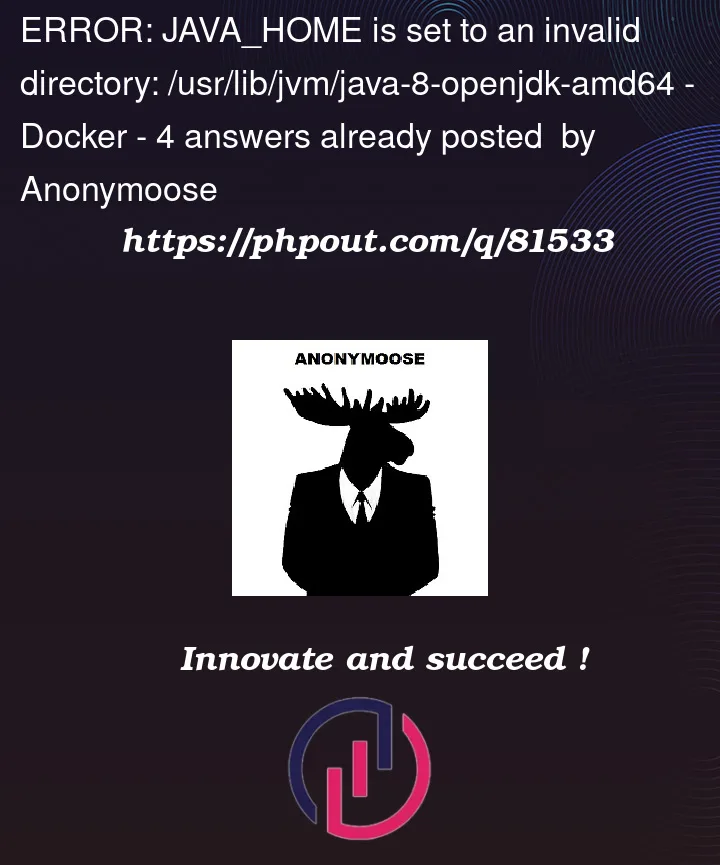I’m fairly new to Docker and am struggling with JAVA_HOME not being seen in a Dockerfile. I get the titular error; which includes Please set the JAVA_HOME variable in your environment to match the location of your Java installation. & executor failed running [/bin/sh -c /opt/Android/cmdline-tools/latest/bin/sdkmanager --update]: exit code: 1 when it runs RUN /opt/Android/cmdline-tools/latest/bin/sdkmanager --update.
I feel like I’m at a loss but I think my issue is not knowing where the JDK is being installed to or knowing how to find it from a Dockerfile; I’ve tried echoing JAVA_HOME thinking I could see it while the image built but, again, no luck. Any help with this would be greatly appreciated. I’ve been pulling my hair out Googling & trying things. Thank you.
FROM node:12.12.0
ARG CMDLINE_TOOLS_VERSION=7583922
ARG ANDROID_BUILD_TOOLS=30.0.3
RUN apt-get -qqy update
&& apt-get -qqy install
python-dev
--no-install-recommends
RUN apt-get install -y software-properties-common gcc
RUN apt-get update && apt-get install -y python3-pip
RUN pip3 install awscli
RUN apt-get install -y jq
RUN mkdir -p /usr/share/man/man1 /usr/share/man/man2
RUN apt-get update && apt-get install -y --no-install-recommends openjdk-8-jdk && apt-get clean;
ENV JAVA_HOME=/usr/lib/jvm/java-8-openjdk-amd64
ENV PATH=$PATH:$JAVA_HOME/bin
RUN wget -q https://services.gradle.org/distributions/gradle-4.5.1-bin.zip && unzip gradle-4.5.1-bin.zip -d /opt && rm gradle-4.5.1-bin.zip
ENV GRADLE_HOME=/opt/gradle-4.5.1
ENV PATH=$PATH:/opt/gradle-4.5.1/bin
RUN wget https://dl.google.com/android/repository/commandlinetools-linux-${CMDLINE_TOOLS_VERSION}_latest.zip
RUN mkdir -p /opt/Android/cmdline-tools
RUN unzip commandlinetools-linux-7583922_latest.zip -d /opt/Android/cmdline-tools
RUN mv /opt/Android/cmdline-tools/cmdline-tools /opt/Android/cmdline-tools/latest
ENV ANDROID_HOME=/opt/Android
ENV PATH="$ANDROID_HOME/emulator:$ANDROID_HOME/tools:$ANDROID_HOME/tools/bin
:$ANDROID_HOME/cmdline-tools/latest:$ANDROID_HOME/cmdline-tools/latest/bin:$ANDROID_HOME/platform-tools:$PATH"
RUN /opt/Android/cmdline-tools/latest/bin/sdkmanager --update
RUN /opt/Android/cmdline-tools/latest/bin/sdkmanager --list
RUN /opt/Android/cmdline-tools/latest/bin/sdkmanager --list | grep build-tools
RUN echo y | /opt/Android/cmdline-tools/latest/bin/sdkmanager "build-tools;${ANDROID_BUILD_TOOLS}" "platform-tools" "platforms;android-30" "tools" >/dev/null
RUN yes | /opt/Android/cmdline-tools/latest/bin/sdkmanager --licenses
CMD ["yarn", "start"]




4
Answers
I think your problem is in the line termination characters of your Dockerfile.
Your Dockerfile works in my computer, and when it comes to weird errors, I have been there.
My experience with Dockerfiles is that sometimes they are very picky in the Windows/Unix/Mac line terminators, so please make sure you save the Dockerfile with line terminators adequate for Unix machines.
I have used the method in this other answer to successfully replace Windows line terminators for Unix’s on Windows using Powershell. I hope this helps!
The exact location of $JAVA_HOME can be scripted. If you don’t feel like hardcoding that directory is a safe bet, replace your
ENVline with thisRUN:RUN export JAVA_HOME=$(readlink -f $(which java) | sed "s:/bin/java::"). This is how I set up my environment in all my Linux machines, and what it does is the following:which javasearches forjavaand will output/usr/bin/java, or something like that, which is a symbolic link.readlink -fover the above will get you to the destination of the symbolic link.| sed "s:/bin/java::"will strip the trailingbin/javaand get you the right value, no matter the version.I also tried your Dockerfile with this change, and it does work too.
I’d suggest to use another base image. Java 11 is required to build for newer API levels:
And then install Python3 and AWS CLI.
Working example:
cloudbuild-android.Or if you want to continue with your’s,
RUN which javawould tell you where it’s actually installed.In a comment, you mentioned:
Maybe I’m missing something, but… doesn’t that mean that the directory does not exist?
Either you got the path wrong, or (as another answer suggested) there’s something in your Dockerfile, probably line endings, that’s mangling your lines.
To discard the bit about line endings, try the same command but switching the parameters, i.e.:
If now it whines about unrecognized options, then it’s probably a line ending issue (which now affects the
toption instead of the directory path).However, if it still says
No such file or directory, then you definitely should check your Java installation path.It looks like you had some network issues during your first docker build run. It failed to install java, but cached the layer with the attempt. I recommend you to run your build again without caching:
docker build -t name --no-cache .and check logging of network operations.